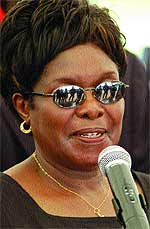UPC Makes a Comeback
From SUNDAY VISION December 18, 2005

THE Uganda People's Congress (UPC) is participating in the 2006 general elections as a party after more than two decades in limbo. Geresom Musamali looked at their manifesto.
THE Uganda People’s Congress (UPC) has reappeared on the political landscape 20 years after it fell from grace.
With the Lord’s Resistance Army (LRA) rebel insurgency still raging in northern Uganda, UPC is promising to vigorously pursue honest and frank negotiations with the top leadership of LRA.
According to the party manifesto, launched by new party leader, Mrs. Miria Obote, at Hotel Equatorial on Thursday, UPC regrets the wrongs it committed against anybody or community during its past two administrations and, in the same vein, condemns the persecution that was meted out on its own members.
The party manifesto, which the party secretary general, Peter Walubiri, called UPC’s third covenant with the people of Uganda, intends to introduce new governance measures to establish peace, which will lead Uganda to economic prosperity. Under those governance measures, UPC will legislate to revert to a two-term presidential limit, review or abolish the office of Resident District Commissioner and reintroduce sub-county chiefs.
Mrs. Obote says they will examine the representation in Parliament to determine if Uganda needs so many special interest groups represented. They also intend to overhaul the Electoral Commission (EC) and set up a Truth and Reconciliation Commission.
The party pledges to re-examine the law reform process and reopen commissions of inquiry reports whose recommendations have never been implemented. It also promises to put in place mechanisms for recovering public property which they say has been looted by private individuals.
Security
On security, UPC’s concern is with the ethnic nature of recruitment, promotion and reward of officers in the army, Police, prisons and intelligence service agencies.
“UPC will set up mechanisms for evaluation of all officers in the army, Police and prisons for effective promotions and awards on a timely and meritorious basis.
We shall do away with the current sectarian, politicised and belated promotions in the army,” Mrs. Obote says. She points out the need to revive the prison industrial and agricultural enterprises so as to train inmates in income-generating activities.
On citizenship, Mrs. Obote intends to review all the immigration laws and policies to guarantee better security for Ugandans.
Economic matters
On economic and financial matters, Mrs. Obote wants Treasury Bills to be issued to members of the public rather than to the commercial banks, so as to encourage banks to look elsewhere for investment options. She also wants the Co-operative Bank revitalised, alongside the co-operative movement.
Mrs. Obote is unhappy with the current social security arrangements, saying the National Social Security Fund will be reorganised. In her manifesto, Mrs. Obote states that she intends to boost domestic tourism and also woo more foreign tourists.
During the first UPC government of 1962-1971, the Government invested heavily in the Uganda Development Corporation (UDC), which was responsible for vetting the establishment of industries throughout the country. Mrs. Obote says she will re-establish the UDC if elected in 2006, so as to achieve parity in the distribution of industries between towns.
On education, although Mrs. Obote believes in continuing with the Universal Primary Education programme, she is against introducing Universal Secondary Education haphazardly. She wants to improve the pupil-teacher ratio and the classroom-pupil ratio in primary schools first.
Mrs. Obote also intends to reopen the Primary Teachers’ Colleges that were closed in the late 1990s by the education ministry.
She says she will stop the State House scholarship scheme and channel it through the Central Scholarship Committee in the education ministry.
During the 1960s the UPC government built 22 hospitals and 38 secondary schools around Uganda. Mrs. Obote wants to build more referral hospitals as opposed to the small health centres that the National Resistance Movement government has built.
Special region
In her manifesto, Mrs. Obote intends to treat northern Uganda as a special region.
She says the region will get a bigger percentage of the health budget, because maternal and infant mortality rates are high in the region and that the region is more prone to diseases because of their living conditions.
Mrs. Obote also intends to develop sports academies and gazette some swamps for fish farming. UPC ruled Uganda twice under the leadership of her husband, Milton Obote.
The first regime, from 1962 to 1971, ended in a coup led by Idi Amin. The second UPC reign from 1981 was also interrupted by a military coup in 1985.
The entry of Mrs. Obote into the presidential race might rekindle the party flame that caused development in 1960s, but failed to light in 1980. Published on: Sunday, 18th December, 2005
 Radio Rhino
Radio Rhino